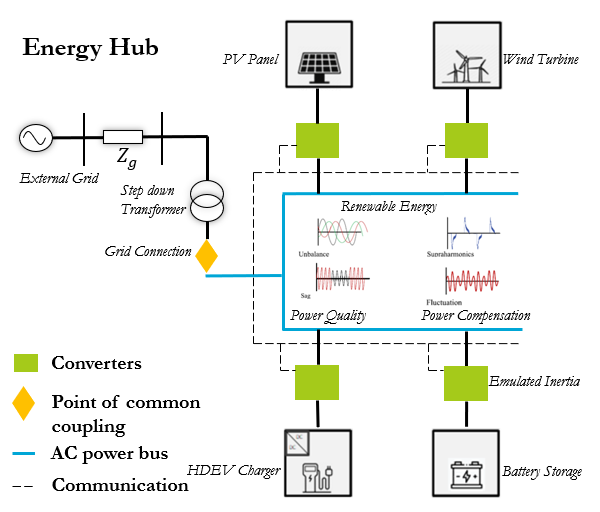Reliability of Grid Connected Power Electronics Converter Systems
Project description
Project Description
The electrification of the heavy-duty industry is crucial to achieving the carbon-neutral climate goal. A highly self-sufficient Energy Hub will be a promising solution to fulfill the power demand of electrified heavy-duty electrical vehicles (HDEV).
However, the energy demand of HDEV is up to hundreds of kilowatt-hours with the charging infrastructure of a megawatt level. The charging level of HDEV is less than 1MW today, which is targeted to be upgraded to tens of megawatts soon. Power quality issues such as voltage fluctuation, harmonic distortion, and flickers are brought to the external grid from the Energy Hub under such high-power demand. Without proper dealing, the lighting of the residence nearby can interfere and the maloperation of Residual Current Devices (RCD) can be induced. Apparently, the power quality analysis of the HDEV charging of an Energy Hub needs to be researched to mitigate the problems and enhance the stability of the grid connection.
Energy Hub (EH) is an energy infrastructure that involves the integration of various energy sources and storage systems. An Accurate and expedited model of the Energy Hub will be built to dive into the power quality analysis. Problems scale from high-frequency harmonics to load flow calculation are analyzed with the built model from switching model to phasorial model. Based on the dedicated analysis tool, mitigation measures are taken to eliminate the power quality problems.
Research Questions:
- What are the Power Quality (PQ) problems of Heavy-Duty Electric Vehicle (HDEV) charging of an Energy Hub?
- How to build an accurate and expedited model of the Energy Hub?
- How to mitigate the PQ problems from control perspective?
- What is the effect of grid connection to external grids with different SCR?
PhD Candidate:
Fan Yang: F.Y.Yang-1@tudelft.nl
Supervisor:
Dr.ir. Zian Qin: Z.Qin-2@tudelft.nl
Promotor:
Prof.dr.ir. Pavol Bauer: P.Bauer@tudelft.nl
